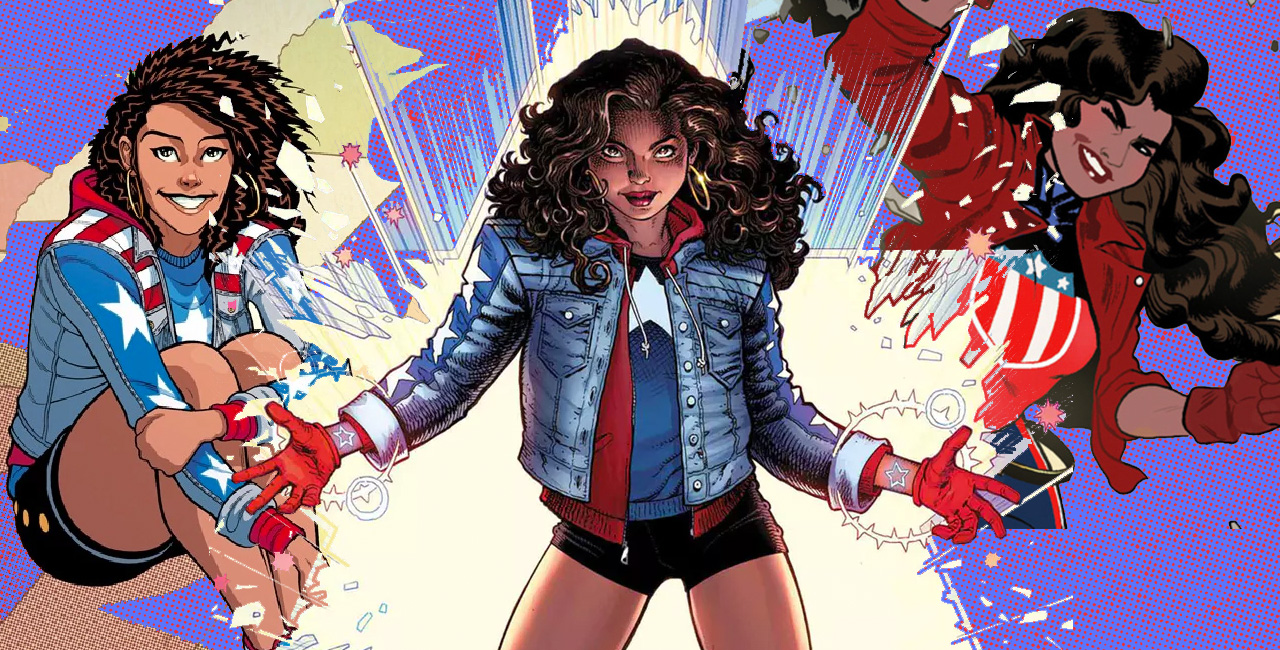In the name of a fresh start, Marvel has begun a wave of comic cancellations that, as usual, have fans at odds, thanks to the rather centered focus on characters of color and women who lead the doomed titles. Among these are beloved newcomers like Gwenpool and America, the latter of which followed America Chavez, a character penned by Gabby Rivera who has represented the Latinx community for several years now. America’s journey is likely far from over; she has already proven herself a formidable ally in team-ups, and thanks to her unique power over time and space, she can seamlessly appear in almost any storyline.
Nevertheless, we will miss her comic series – not only because it was one of the few Big 2 titles with a Latinx woman lead (who also happened to be LGBTQ+) but because the point of view that America holds is one of that’s particularly unique within the endless pages of Marvel comics. The series let fans in on how that affected the seemingly unmovable heroine, humanizing her beyond the gruff exterior that effectively makes her far too cool for any team she happens to join (which, by the way, isn’t really bad at all).
If you grazed over this series and don’t mind spoilers, here are seven reasons to pick it up in the aftermath. Below, get to know everyone’s new favorite portal-hopper before she (hopefully) goes on to steal the show in another title.
1
Punching Nazis
After using a time traveling device under the care of Prodigy, a fellow former Young Avenger, America travels back to WWII Germany and meets Captain America himself. It’s sort of awkward and hilarious, but it almost welcomes America into the long line of heroes who have shared a variation of her and Cap’s monikers before. After accidentally ruining a Nazi effort to attack US soldiers by merely dropping in, America stumbles upon Cap, notices Hitler, and decks him right in his crummy face. Unfortunately, a quick punch can’t end a whole regime, and America must face an even more powerful force than Cap himself: Commander Peggy Carter, who plays a role in America’s journey.
2
Tough Exterior, Soft Interior
It doesn’t take long for America to face the fact she’ll never seen her parents again. After losing them as a child, she faces off against figments of them in the second coming of the Young Avengers and is still hit with those awful pangs of separation in the first few pages of her series. It’s not the last time we see America working through her grief, and unlike the Strong Female Character trope that tends to suppress these kinds of feelings, America finds herself more powerful when she learns to cope.
3
Relationships, Superheroism, and Balancing It All
From the get-go, her relationship with girlfriend, Lisa, is challenged by America’s own goals to leave superheroism and start a life as a college student at an academy specifically for people with otherworldly powers. Lisa, with a job tightly tied to her city and a future of her own to determine, decides she can’t tag along. Despite America’s initial fury, she eventually accepts it and saves Lisa after the Chavez Guerrillas kidnap her. It’s a healthy balance, guided by mentors like Storm and Peggy, along with Kate Bishop, and even Lisa herself.
4
Friendship with Kate
Some of the most compelling scenes in this short series happen between America and long-time friend and confidant Kate Bishop. There’s something unique about their friendship – perhaps how their closeness so often teeters into shippable territory. Beyond the playful flirting, America has a home in Kate in more ways than one: a safety net, an oath keeper, and a loyal friend who will never leave her hanging. In the aftermath of her breakup, America once again turns to Kate.
5
Focus on Latinidad
While America isn’t from Earth, or really even from the same dimension as many other Marvel heroes, after leaving the Utopian Parallel America travels throughout different places and realities, finding homes within various Latinx communities. But when it’s time to find out more about herself, we’re given something beyond the stories that many of us feel so familiar with. America’s experiences on the Ancestral Plane give her a smart, honest backstory that creates a whole new world of science fiction and imagination around her Latinidad.
6
Unrelenting Queerness That Doesn’t Care If You Like It Or Not
From the beautiful sacrifice of love that America’s parents Amalia and Elena make to the presentation of non-binary characters helping America save the day, the LGBTQIA+ community is given a spotlight that doesn’t skew toward the more fearful, safe areas common in many Marvel comics.
In Issue No. 4, America teams up with Prodigy, the LeeluMultipass Phi Theta Betas from her school, and a group of fangirls who call themselves the Chavez Guerillas in order to take down the power that has caused her so much trouble. This series presents queer characters as everyday heroes.
7
“Be brave, America. Be soft.”
So much of America’s journey is about learning to open up beyond her tough semi-act and let people in – not only physically, but mentally and emotionally. After meeting Madrimar and going on her own spiritual journey, America truly understands what she seems to tell herself within her inner monologues. She’s constantly trying to learn a lesson that she doesn’t even know how to pursue, and while her time with Madrimar opens her powers to a whole new level, it’s her personal growth from wise-cracking tough girl to someone who can feel whole that makes her such a unique character to follow.




